FYSRE recipients highlight impact of their summer research experience
The Erich Vogt First Year Summer Research Experience (FYSRE) program offers research opportunities to budding academic stars after their First Year Physics courses. Selected students work in either a UBC Physics & Astronomy or a TRIUMF laboratory, under the supervision of a UBC/TRIUMF researcher. Deadline for 2022 applications is on January 31st, 2022.
We caught up with three students - 2021 recipients Valentina Mazzotti and Annudesh Liyanage and 2020 recipient Justin Lawrence on their research experience in the past summer.
Valentina Mazzotti with Dr. Andrea Damascelli of UBC Physics & Astronomy at the Stewart Blusson Quantum Matter Institute (SBQMI).
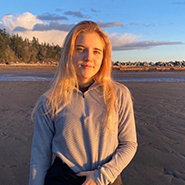 Valentina worked on the hardware and the software required to track the position of micrometre size samples inside the ARPES spectrometer during laser-based photoemission experiments on cuprates and other quantum materials.
Valentina worked on the hardware and the software required to track the position of micrometre size samples inside the ARPES spectrometer during laser-based photoemission experiments on cuprates and other quantum materials.
Has this experience changed your mind about working/not working in Physics?
The FYSRE experience has been a rewarding personal experience that confirmed my desire to pursue a career in physics. In fact, I’m grateful that I was introduced to the field of physics I am most interested in, namely condensed matter physics, at such an early stage of my degree. Moreover, the FYSRE summer experience was also an opportunity to understand how essential determination, persistence and curiosity are in the field of research and in general it taught me what it means to work as a researcher.
What were the new experiences you had that would not have been possible without FYSRE support?
The FYSRE support gave me the opportunity to get an early exposure as an undergraduate student to research and act as an active member of a group. In fact, being part of one of the research teams at SBQMI (the ARPES group) meant also attending weekly meetings where we as members would come together to discuss progress or potential problems we were facing. It was very interesting to see how the exchange of thoughts and ideas works inside a research group and being actively involved in it was surely a great learning experience.
What was your most memorable moment?
In the beginning of August, I had to monitor the position of a sample inside the ARPES machine for the entire night. I started running my monitoring program and the camera setup in the late afternoon. However, at around 2am in the morning, the program suddenly terminated and the camera that had to record images of the back of the cryostat disconnected from the system. Since I was living on campus, I decided to take my bike and take a ride to the SBQMI to reconnect the camera. It was an interesting feeling to be the only one in a physics lab at 2am in the morning…
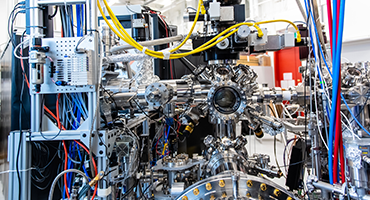
Anything else you would like to share?
I want to thank SBQMI and especially the ARPES group for all the support I received throughout the summer. Not only did they provide me with material and research papers that helped me get an insight into the field of condensed matter physics, but all the group members were also extremely supportive and keen on sharing their expertise and knowledge with me.
Annudesh Liyanage with Dr. Ruediger Picker of the Ultracold Neutron (UCN) group at TRIUMF
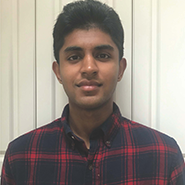 Annudesh worked with the UCN group; one of the lab's key focuses is the neutron electric-dipole moment experiment, whose results may give us information on the matter-antimatter asymmetry in the universe.
Annudesh worked with the UCN group; one of the lab's key focuses is the neutron electric-dipole moment experiment, whose results may give us information on the matter-antimatter asymmetry in the universe.
Has this experience change your mind about working/not working in Physics?
One of the main reasons I applied for this award was to gain exposure to physics research. I’m still very unsure of what I want to pursue in the future but this opportunity has shown me that physics research is a career path that I’m passionate about. I loved the work environment of the UCN group (with a good mix of individual and collaborative work) and I really enjoyed the process of using computational physics to get experimental results and then comparing this to our models/predictions. I’m truly eager to work at TRIUMF again.
What were the new experiences you had that would not have been possible without FYSRE support?
Looking back to when I started my position, I had very little experience with computational physics and programming (I didn’t even know how to run a command line). However, by the end of my work term, I was submitting huge simulations to computer clusters and programming my own code to analyze the data. Further, I came in on a weekly basis to do some cabling for a new PLC cabinet. I also had no prior knowledge or experience with this but by the end of the summer, I had become very familiar with the tools and techniques that are used for this kind of work. I’ve acquired so many skills over this summer and I will surely make use of them in future work placements. Without FYSRE support, I would not have found a job that provided so many opportunities to expand my skillset.
What was your most memorable moment?
My favourite experience at TRIUMF would have to be the time I obtained my first energy spectrum. After months spent getting familiar and working with the theory of the experiment, the simulation’s program, the model for the spectrometer and the Compute Canada servers, I was finally able to produce my first real experimental result. It’s worth noting that it was far from perfect but the fact that it was acceptable made all the time and hard work I put it into it completely worth it.
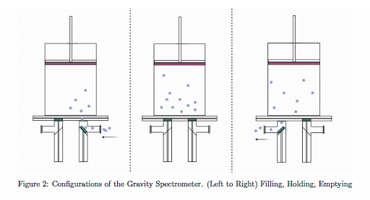
Anything else you would like to share?
The work environment at TRIUMF is amazing. One thing I didn’t know about prior to my job is the number of resources they allocate to students. We had weekly professional development seminars which were very helpful and a great chance to meet the other students. Plus, we got weekly sessions with a small group of students (4-5) and a supervisor where we could all talk about the progress we had make that week and also ask questions to our supervisor about his/her experiences. These were a great addition to my experience at TRIUMF.
I would like to thank you all again. My work term at TRIUMF was amazing: I had a great supervisor, I developed so many new skills and for the first time, I produced experimental results that were used by others. This opportunity will surely open many more doors for me.
Justin Lawrence with Dr. Scott Oser of UBC Physics & Astronomy
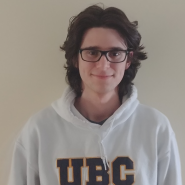 What was your research project about?
What was your research project about?
This summer I was working on analyzing how different velocity distributions of dark matter near Earth would affect the potential dark matter signals that could be observed by detectors. I then used this to re-analyze some past dark matter search results, and project the sensitivity of future detectors. This primarily consisted of implementing existing physics models in code, which usually required some level of mathematical manipulation to work.
What were the new experiences you had that would not have been possible without FYSRE support?
I don't think the research in general would have been possible without FYSRE support. The ability to reach out to professors already having some support made me much more confident in doing so, and I probably wouldn't have found my position working for Dr. Oser without it.
What was your most memorable moment?
One of my supervisors and I spent weeks trying to replicate previous results, and were on the verge of proposing that they might be wrong until somebody informed us that an equation had just been labelled wrong the whole time. That was a couple weeks of utter chaos leading up to it.